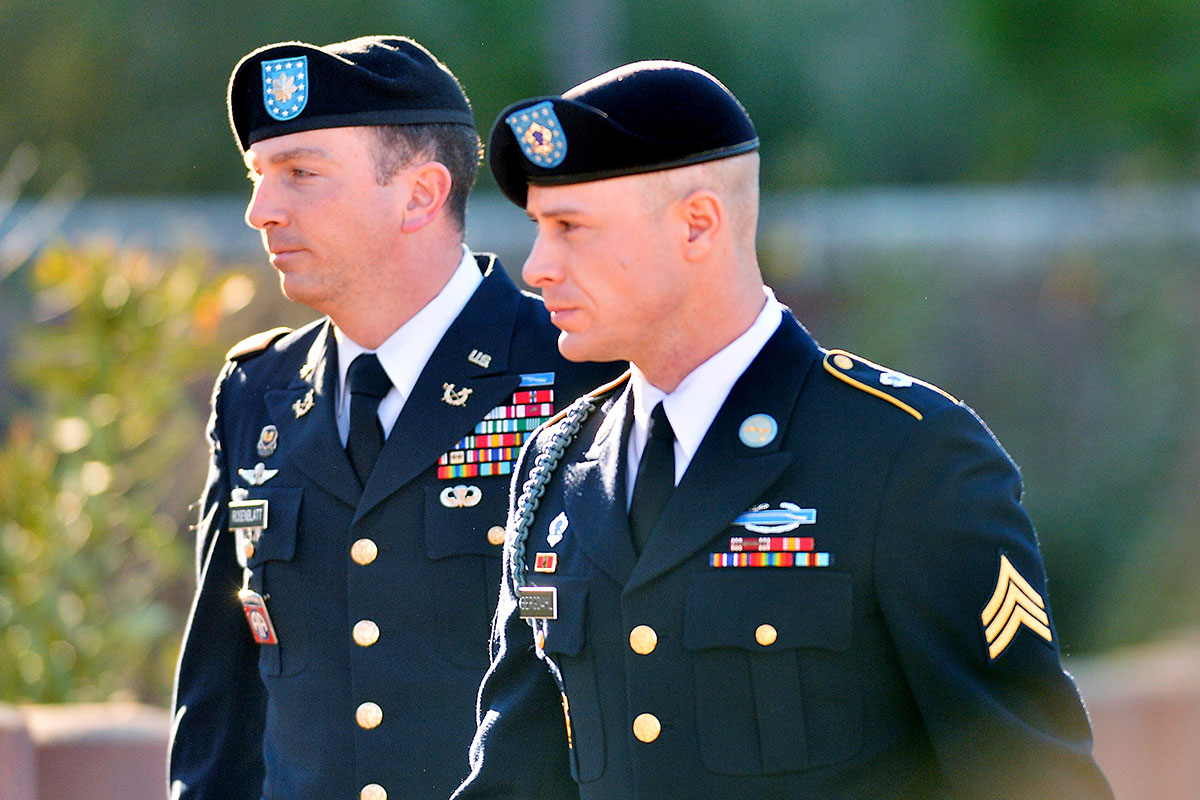U.S. Army Lt. Col. Frank Rosenblatt said he always found military justice – with its uniforms and traditions carried over from 18th-century England – exciting because it offered the drama of real-world events played out in a courtroom.
That drama was kicked up a notch when the 2006 graduate of the University of Virginia School of Law was assigned to defend Sgt. Bowe Bergdahl against charges of desertion and misbehavior before the enemy.
“It’s been an interesting and complex case,” Rosenblatt said. “The level of animosity toward Sgt. Bergdahl has been extraordinary.”
Bergdahl left his combat outpost in Afghanistan’s Paktika province on June 30, 2009, and was quickly captured by the Taliban. He was a prisoner of the Taliban for nearly five years before he was freed through a controversial swap with Guantanamo Bay prisoners on May 31, 2014. Questions soon arose over why Bergdahl left his post and the consequences for his fellow soldiers, however. The former POW is now scheduled to face a court martial starting Aug. 8.
Even as he confronts a potential life sentence, Bergdahl is telling his story on the second season of “Serial,” the Peabody Award–winning podcast that last year focused on a murder case and featured UVA Law’s Innocence Project Clinic. The publicity surrounding Bergdahl’s case has grown further since presidential candidate Donald Trump called him a “no-good traitor” who should be executed.
“We want Sgt. Bergdahl to have a fair trial,” Rosenblatt said.
Now deputy chief of the U.S. Army Trial Defense Service in Fort Belvoir, Rosenblatt joined the military through ROTC while studying at James Madison University, to help pay for college. After college he served for five years as an Army officer in South Korea, the Balkans and eventually with the 82nd Airborne Division as it pushed into Iraq in 2003.
The Army offered to pay for Rosenblatt’s dream of going to law school if he committed to the Judge Advocate General’s Corps for six more years, a deal he was happy to take. At UVA Law, he was president of the Human Rights Study Project, leading a small team of students to Syria and Lebanon to study human rights, coincidentally as early signs of the 2005 Arab Spring were emerging. But he found his calling in criminal law during his first year after a “wonderfully creative and historically rich” lecture by Professor John Jeffries.
“UVA ably prepared me for the craft of the legal profession,” Rosenblatt said. “What I enjoyed most was law school as a creative outlet: being around professors and students who were coming up with new ways of thinking about old problems, such as my classmate Leslie Kendrick’s work on criminally instructive speech.” (Kendrick is now a professor at the school.)
Rosenblatt, who is married to 2006 classmate Alexandra Rodu Rosenblatt, moved with his family to Arlington last summer to take on his current post supporting 150 defense attorneys around the world.
“Military defense attorneys are independent from the chain of command, which means they’re often by themselves at an installation without a lot of local support nearby,” he said. “We try to support defense attorneys throughout the Army so they can do their jobs effectively and zealously, which in turn gives soldiers confidence that they will receive fair treatment in the military justice process.”
Rosenblatt said the twists and turns in his career, whether changing from prosecution to defense, or working at home or abroad, are not unusual for a military lawyer.
“I’ve enjoyed all of my jobs,” he said. “Military attorneys are rotated frequently so that they become broadly skilled in different areas of the law. This is thought to increase their effectiveness during military operations.”
Though based in Northern Virginia, he often makes trips to Fort Bragg, North Carolina, for hearings and trials, including Bergdahl’s pretrial hearings. In that case, he serves with civilian lawyer Eugene Fidell, a Yale Law School lecturer and well-known military law expert. Fidell and Rosenblatt are working together on a military justice casebook, along with Dwight H. Sullivan, a 1986 graduate of UVA Law, of the Defense Department’s Office of General Counsel; and University of California-Hastings College of the Law Dean Elizabeth L. Hillman.
The defense team faced a setback in December when an Army general sent the case to a general court martial, where Bergdahl faces the possibility of a life sentence, rather than a special court martial, in which the maximum sentence would be a year in prison. An investigating officer and preliminary hearing officer had each previously recommended that Bergdahl’s case did not merit jail time.
“The convening authority did not follow the advice of the preliminary hearing officer, who heard the witnesses,” Fidell said in a statement about the general court martial decision. The defense team “hoped the case would not go in this direction.”
That decision came days after Bergdahl’s first interview on “Serial” was released. In the podcasts, Bergdahl has detailed the torture and arduous conditions he faced during captivity.
An independent Army psychiatry board that reviewed Bergdahl’s case said he had a “severe mental disease or defect” at the time he left the outpost.
“We are grateful for the many military service providers and professionals who, after he was returned, have assisted him in getting things back together,” Rosenblatt said. “I like Sgt. Bergdahl. I enjoy working for him, and I respect him.”
Media Contact
Article Information
February 2, 2016
/content/defending-bowe-bergdahl

